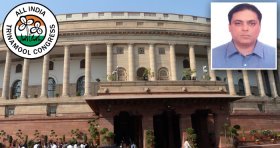March 10, 2016
Nadimul Haque speaks on the Real Estate (Regulation and Development) Bill

Sir, today I stand before the House to discuss the Real Estate Bill. In my opinion, the real estate sector constitutes as the most important building block of a nation, as it provides infrastructure and housing for a better life to all the people residing in the country. However, in our country, a specific law, stating the duties and rights of buyers and promoters involved in the real estate sector, has been largely left unaddressed. Though the consumer in our country could avail the remedies available under the civil, criminal and consumer laws against these players, yet these remedies are not broad enough to address all the issues and concerns of the buyers and consumers of real estate. This situation has led to gross mismanagement and unprofessionalism in the field of real estate, wherein the project developers indulge in tactics of deliberate delays and other wrongdoing. In order to address these issues, the Real Estate (Regulation and Development) Bill was introduced in the Rajya Sabha in 2013. It was later referred to the Standing Committee and then to the Select Committee. Both these Committees have submitted their reports. The Bill, as it stands today, regulates transactions between buyers and promoters of residential real estate projects. It establishes State-level regulatory authorities, called the Real Estate Regulatory Authorities (RERAs). The promoters need to be registered with the RERAs. They cannot book or offer their projects for sale without registering. The real estate agents, dealing in these projects, also need to register with the RERAs. On registration, the promoter must upload the details of the project on their website.
Sir, the Bill also contains the penalty provisions. In case, the promoter fails to register the property, he may be penalized up to 10 per cent of the estimated cost of the project. Failure to do this, despite orders issued by the RERA, will lead to imprisonment up to three years.
He will have to also pay 5 per cent of the estimated cost of the project if he violates any other provisions of the Act. However, Sir, there are some grey areas in this Bill which I would like to point out clause-wise.
Clause 3(2)(a), which relates to the registration of real estate project, of the original Bill mandated that registration was not necessary where the area of the land proposed to be developed does not exceed 1000 square metres or the number of apartments proposed to be developed does not exceed 12. Sir, the Select Committee reduced this to 500 square metres and 8 apartments, and power was given to the appropriate Government to reduce the threshold from 500 square metres and 8 apartments. Sir, it is pertinent to mention that if this clause is passed, then it may lead to the exclusion of middle class or poor class who are vulnerable to a higher rate from the promoters.
Sir, secondly, as per Clause 4(2)(i)(d), the original Bill puts a positive obligation on the promoter to put 50 per cent funds, as notified, in a separate bank account for construction work. Sir, it does not take into account the fact that there might be different situations in different States wherein the cost of land may be higher than the cost of construction.
Sir, Clause 5(2) in the original Bill stated that if the application of the promoter to register is not accepted or rejected in 15 days, then the project shall be deemed to be registered. The Committee recommended that this period be extended to 30 days. Sir, I have to say that the said clause can be subjected to abuse as there might be a lot of instances that the authorities might not be able to register a promoter project due to overburden of work.
Sir, Clause 7(1)(a) states the revocation of registration. The original Bill included ‘wilful default’ on the part of the promoter to do anything under the Act will lead to revocation of the registration. The panel had recommended that the word ‘wilful’ be deleted from the definition. However, Sir, the recommendation of the panel to delete ‘wilful’ is meritorious. At the same time, the recommendation tilts the balance in favour of the buyer and against the promoter. The promoter is now strictly liable under the Bill for any default.
By deleting the word ‘wilful’ from the definition, the promoter is now liable also in a case where he may have acted in good faith. The aforesaid recommendation would equally establish a balance between the right of the buyer as well as that of an honest promoter.
Lastly, Sir, this Bill does not include anything about the sanctioning authorities. For example, even if a project is completed and there is a delay in seeking a completion certificate from the local authority or there is a delay in obtaining electrical and water connections, the project cannot be offered for possession to the buyers on time. For this purpose, Sir, rules and recommendations to the sanctioning authorities have to be incorporated in the Bill.
With this, Sir, I rest my case supporting the Bill. Thank you.
